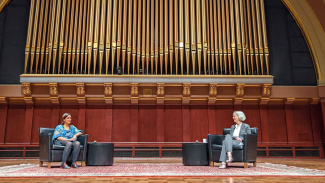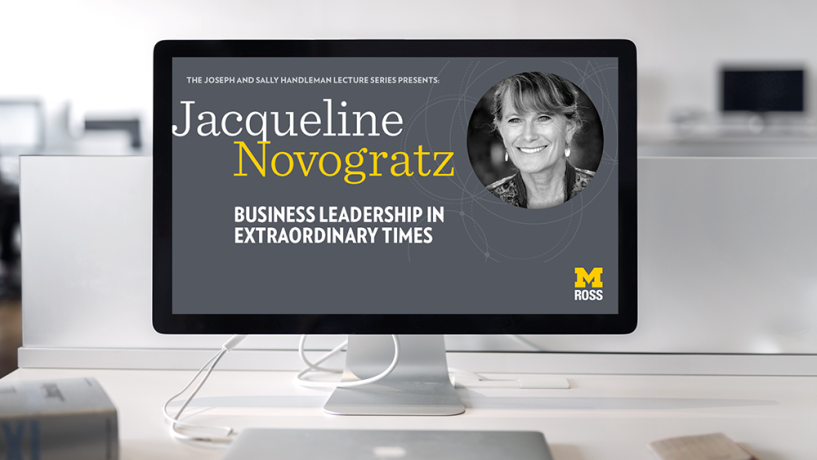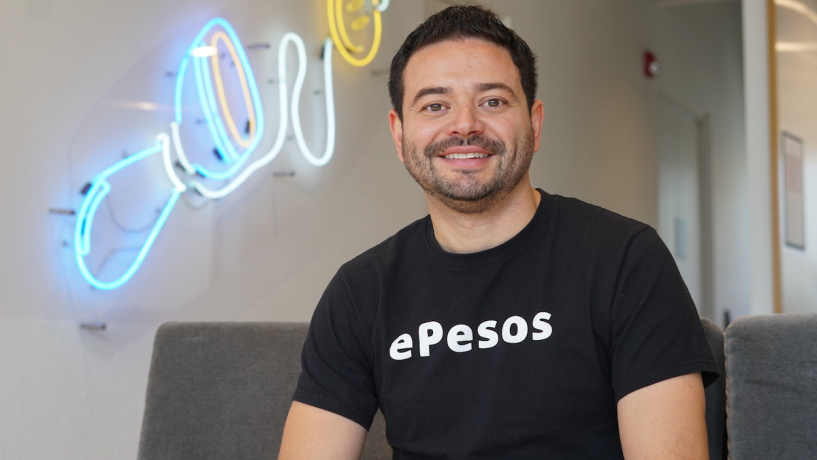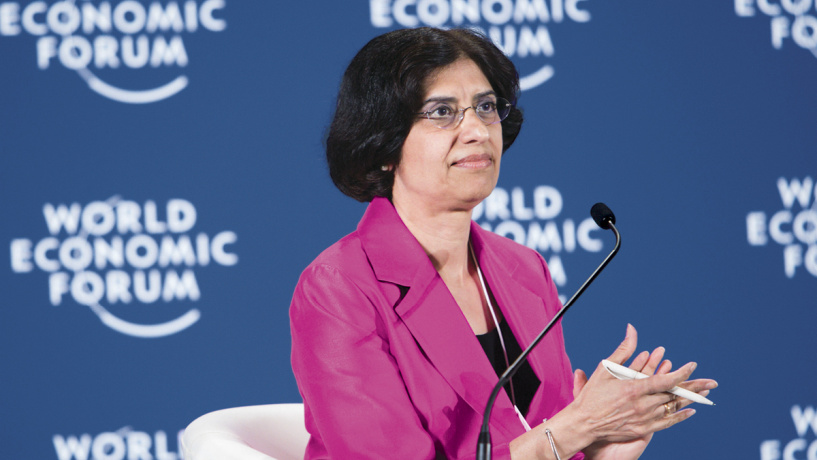Nobel Prize-Winning Economist Esther Duflo Provides Insight Into How Business Decisions and Business Students Can Positively Impact the World at Handleman Lecture

The Ross School of Business recently welcomed Nobel Prize-winner and development economics expert Esther Duflo as the 2021 Joseph and Sally Handleman Lecture Series speaker.
Duflo joined more than 1,000 Michigan Ross undergraduate students, faculty, staff, and other members of the University of Michigan community at Hill Auditorium for an insightful discussion on ways to think beyond profit to the impact businesses have on society.
Duflo is the Abdul Latif Jameel Professor of Poverty Alleviation and Development Economics at the Massachusetts Institute of Technology. Her research focuses on understanding the economic lives of the poor, aiming to help design and evaluate social policies to improve citizens’ well-being and protect human dignity. She also is the co-founder and co-director of MIT’s Abdul Latif Jameel Poverty Action Lab, and she has received numerous academic honors and prizes, including the 2019 Sveriges Riksbank Prize in Economic Sciences in Memory of Alfred Nobel.
From impact as a hobby to impact as a career
Francine Lafontaine, interim dean at Michigan Ross, first asked Duflo the fundamental question of what inspired her to perform the work she does.
“When I was a kid, I thought I had a responsibility to poor people in the world,” said Duflo. “I kept thinking that there was really a huge injustice in the fact that I am born into a middle-class educated family, when I could have been born a poor girl in Morocco, in the Sahara, having to take care of collecting water for the whole family. I kept thinking that this means that I have a job to do, and I have to do something.”
Duflo explained that she previously believed that her mission of helping people had to be a side project. However, she described that on a trip to Russia when the country was under socialist rule, she realized that economists have an enormous impact on the world because they influence the decisions that policy experts make.
Shortly after, Duflo came to the U.S. to study at MIT and recognized that through a career focused on development economics and poverty alleviation, she could make a positive impact.
“I realized how my dream of making a difference, however small, didn't have to be a hobby; it could be my job,” she said.
Shifting business values from profit to impact
From her knowledge and experience, Duflo said business students and employers should think about the role big and small businesses have in making a positive difference.
“The business practices that you decide to use, the environmental practices that you adhere to, the technology that you will bring in, the standards that you might set on the people who you are doing business with, in terms of how they deal with their own employees, in terms of the quality that they provide, and so on, are going to have ripple effect in society well beyond your own activities,” she explained.
Duflo said that by being a “norm setter” for other actors in society and by investing in employees, any business can make an impact on people living in the developing world.
“In finding out how to attract, train, and retain workers and give them good jobs, I think that is a way in which businesses big and small are key influences in the community as employers,” she said.
A call to action for the next generation of business leaders
Throughout the lecture, Duflo shared many inspirational stories and words of advice for how the world’s next generation of business leaders can make an impact through their career.
She shared two pieces of advice with the Michigan Ross students in the audience.
First, she said: “Love what you do, and do what you love. It’s deeper than just going to make you happy. It’s also going to make you productive.”
Next, Duflo advised students to take one problem at a time to make a difference.
Especially now, the world might seem so confusing and there are so many problems that seem so big, it is pretty easy to just give up, and to not try to change it or to not try to fix it. But in fact, the reality is you can pick one problem and attach your mind to it, and energy to it, and training to it, and you will make a difference in that little corner of the world. And then you can move to the next little corner of the world, and make a difference there. And before you know it you will have made a big difference.
To end the discussion, Lafontaine asked if Duflo had one call to action she wanted to share with the audience.
“Find what your goal is to be active now, whatever that happens to be,'' said Duflo. “Keep these two things with you - longing to understand the reasoning and longing to find a place to make yourself useful. It could be in a soup kitchen or it could be doing a small piece of a much greater venture.”
WATCH THE 2021 HANDLEMAN LECTURE
Michigan Ross launched The Joseph and Sally Handleman Lecture Series in 2012 through the generous support of the Joseph and Sally Handleman Charitable Foundation. Topics of the Handleman Lecture Series focus on cutting-edge issues and keep students in the forefront of emerging business challenges and opportunities.







